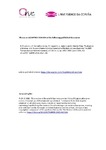Evaluation of Analog Joint Source-Channel Coding Systems for Multiple Access Channels

Use este enlace para citar
http://hdl.handle.net/2183/35663Colecciones
- Investigación (FIC) [1678]
Metadatos
Mostrar el registro completo del ítemTítulo
Evaluation of Analog Joint Source-Channel Coding Systems for Multiple Access ChannelsAutor(es)
Fecha
2015-06Cita bibliográfica
O. Fresnedo, J. P. González-Coma, M. Hassanin, L. Castedo and J. García-Frías, "Evaluation of Analog Joint Source-Channel Coding Systems for Multiple Access Channels," in IEEE Transactions on Communications, vol. 63, no. 6, pp. 2312-2324, June 2015, doi: 10.1109/TCOMM.2015.2427164
Resumen
[Abstract]: We address the evaluation of low-complexity analog Joint Source Channel Coding (JSCC) methods for the transmission of discrete-time analog symbols over Multiple-Input Multiple-Output (MIMO) Multiple Access Channels (MAC). Analog JSCC is employed to encode the source information at each transmitter prior to be directly input to the MAC access scheme. Three channel access methods are considered to ensure the receiver is able to recover the user information: Code Division Multiple Access (CDMA), linear MMSE access codes and opportunistic access. CDMA allows the orthogonal transmission of the user data requiring only Channel State Information (CSI) at reception. On the other hand, linear MMSE access codes exploit CSI knowledge at transmission and exhibit better performance. Finally, opportunistic access also exploits CSI at transmission and allocates all MAC resources to the user with the strongest channel. This latter access scheme exhibits the best performance in terms of sum distortion although it may lead to unfair rate distributions among users.
Palabras clave
Analog joint source channel coding
Multiple access channels
CDMA
Linear MMSE transceiver
Multiple access channels
CDMA
Linear MMSE transceiver
Descripción
© 2015 IEEE. This version of the article has been accepted for publication, after peer
review. Personal use of this material is permitted. Permission from IEEE must be
obtained for all other uses, in any current or future media, including
reprinting/republishing this material for advertising or promotional purposes, creating
new collective works, for resale or redistribution to servers or lists, or reuse of any
copyrighted component of this work in other works. The Version of Record is available
online at: https://doi.org/10.1109/TCOMM.2015.2427164
Versión del editor
Derechos
Todos os dereitos reservados. All rights reserved.
ISSN
0090-6778
1558-0857
1558-0857





